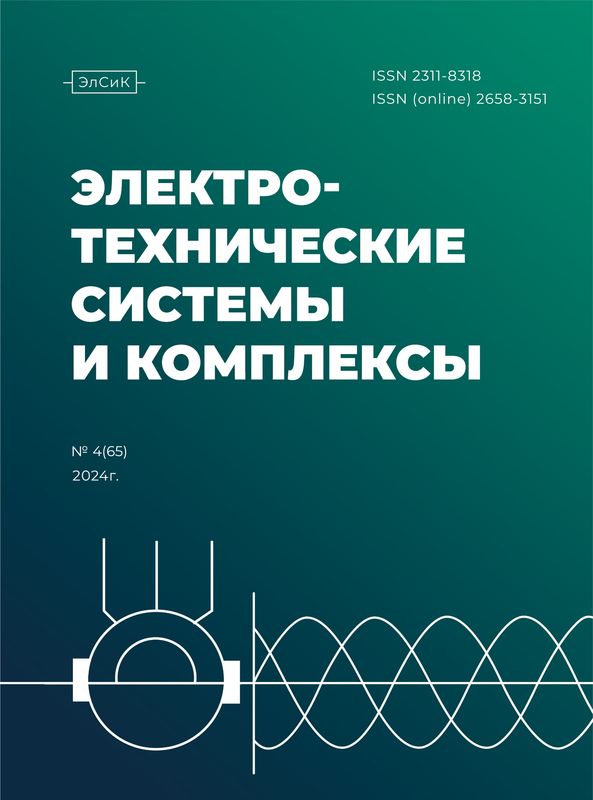Abstract
Currently, due to the deteriorating environmental situation, an increase in the share of renewable energy sources is the main direction for the development of the electric power industries in many countries. An important stage in the creation of new power plants is simulation, which makes it possible to analyze the operation of equipment in various conditions, including violation of the limits of normal operation, and to reduce the number of possible design errors. This article describes the development and application of a simulation model of a system for generating electricity based on renewable sources with a system for assessing and predicting the technical condition of equipment. The simulation model is implemented in the Matlab Simulink environment. Oscillograms of currents and voltages were obtained when the model was operating with an electrical load of 10 kVA for converters of wind and solar energy. A system for monitoring the technical condition of equipment based on the Mamdani-Zade fuzzy input system has been developed, which forms an assessment of the technical condition of the power plant elements based on diagnostic parameters in accordance with the base of expert rules. The obtained estimates of the technical condition of the equipment are processed using an adaptive neuro-fuzzy inference system (ANFIS), which forms a forecast of the technical condition of the equipment at a given time interval. The constructed model can be used in the design of renewable energy facilities, as well as in the development and testing of algorithms for control and monitoring systems. The system for assessing and predicting the state of equipment using a fuzzy logic apparatus can be used to support decision-making by the operator of an electric power plant when determining the need for repair and replacement of equipment.
Keywords
Renewable energy, simulation model, fuzzy logic, technical condition diagnostics, monitoring system.
1. Yang C., Liu J., Zeng Y., Xie G. Real-time condition monitoring and fault detection of components based on machine-learning reconstruction model. Renewable Energy. 2019. No. 133. Pp. 433-441. doi: 10.1016/j.renene.2018.10.062.
2. Nazarychev A.N., Novomlinsky E.V., Andreev D.A. Assessment of the technical condition of electrical equipment based on calculations of integral indicators. Metodicheskie voprosy issledovaniya nadezhnosti bolshikh system energetiki: materialy Mezhdunarodnogo nauchnogo seminar im. Yu.N.Rudenko. [Methodological issues in the study of the reliability of large energy systems. Yu.N. Rudenko International Scientific Seminar]. Syktyvkar, Komi Republican Printing House, 2016, pp. 171-179. (In Russian)
3. Gangsar P., Tiwari R. Signal based condition monitoring techniques for fault detection and diagnosis of induction motors: A state-of-the-artreview. Mechanical Systems and Signal Processing. 2020. Vol. 144. Pp. 1-37. doi: 10.1016/j.ymssp.2020.106908.
4. Choudhary A., Goyal D., Letha Shimi S., Akula A. Condition Monitoring and Fault Diagnosis of Induction Motors: A Review. Archives of Computational Methods in Engineering. 2019. No. 26. Pp. 1221-1238. doi: 10.1007/s11831-018-9286-z.
5. Baydyuk M.A. Komarova G.V. Assessment of the technical condition and reliability of electrical machines. Izvestiya SPbGETU «LETI» [Proceedings of Saint Petersburg Electrotechnical University], 2019, no. 3, pp. 78-84. (In Russian)
6. Levin V.M., Kerimkulov N.N. Express assessment of the state of power transformers to ensure operational reliability. Sistemy. Metody. Tekhnolodii. [Systems. Methods. Technologies], 2016, no. 4 (32), pp. 101-109. doi: 10.18324 / 2077-5415-2016-4-101-109. (In Russian)
7. Shi M., Wang J., Xu Y., Huang K., Li H., Wang P. Condition Monitoring of PWM Converter Based on Multiple Support Vector Machine Algorithm. 10th International Symposium on Power Electronics for Distributed Generation Systems (PEDG). IEEE, 2019. Pр. 264-268. doi: 10.1109/PEDG.2019.8807567.
8. SteklovА.S., Titov V.G., Serebryakov А.V. Expert systems for processing diagnostics results. Nauchnyi almanakh. [Scientific almanac], 2015, no. 10-3, pp. 247-250. (In Russian)
9. Saushev А.V. Oblasti rabotosposobnosti elektrotekhnicheskikh system [Working efficiency areas of electrical engineering systems]. St. Petersburg, Polytechnica Publ., 2013. 412p. (In Russian)
10. Serebryakov A.V., SteklovА.S., Titov V.G. Monitoring i prognozirovanie tekhnicheskogo sostoyaniya avtonomnykh elektrotekhnicheskikh kompleksov [Monitoring and forecasting technical condition of stand-alone electrical engineering complexes]. Nizhny Novgorod, Nizhny Novgorod State Technical University n.a. R. E. Alekseev Publ., 2018. 174p. (In Russian)
11. Kocheganov D.М., SerebryakovА.V. Fuzzy logic apparatus to assess synchronous generator performance. Energoeffektovnost i energobezopasnost proizvodstvennykh protsessov (EEPP-2019) [Production processess energy efficiency and energy security (EEPP-2019)], Toliatty, Toliatty State Univerdity Publ., 2019, pp. 186-189. (In Russian)
12. Kocheganov D.М., SerebryakovА.V. Fuzzy logic system for assessment of frequency converter operating quality. Intellektualnaya elektrotekhnika [Smart Electrical Engineering], 2019, no. 4, pp. 27-34. (In Russian)
13. Kocheganov D.М., SerebryakovА.V. Fuzzy logic to assess photovoltaic panel performance. Fedorovskie chteniya: materialy mezhdunarodnoy konferentsii [International conference "Fedorov readings"]. Moscow, MPEI Publ. House, 2019, pp. 300-304. (In Russian)










